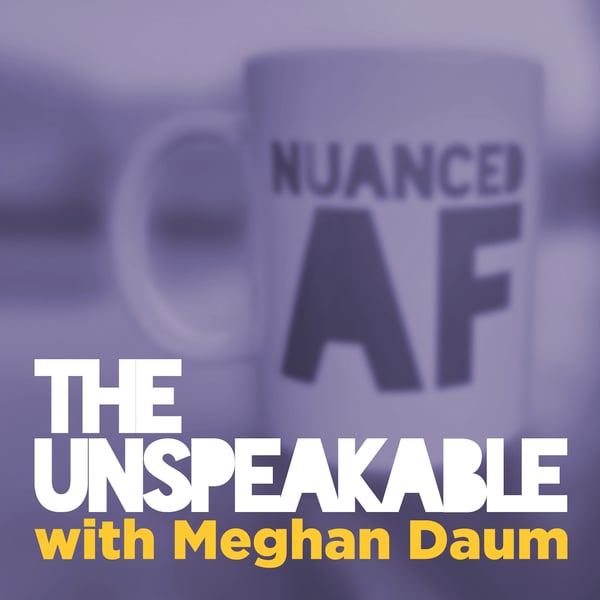PREMIUM: Doctors In Denial Of Death - Dr. Sunita Puri calls for a better approach.
The Unspeakable Podcast
Meghan Daum
4.8 • 784 Ratings
🗓️ 13 September 2024
⏱️ 12 minutes
🧾️ Download transcript
Summary
This is a PREVIEW of a PREMIUM episode for paying subscribers, Meghan welcomes back writer and physician Dr. Sunita Puri, a palliative care specialist who writes with exquisite care and candor about end-of-life issues. Sunita was on the podcast a little over a year ago talking about the hidden harms of CPR, which she wrote about for The New Yorker. She’s back to discuss two articles she published this summer. One in The Atlantic about how doctors deal with terminal illness in younger patients and another in The Wall Street Journal about dying at home. We’ve been taught to assume that a good death means dying at home, or at least not in a hospital, but Sunita points out that this can be better in theory than in practice. This is another extraordinary conversation with one of listeners’ favorite guests.
GUEST BIO
Dr. Sunita Puri is a palliative care physician and author of That Good Night: Life and Medicine in the Eleventh Hour, a literary memoir recounting her journey to the practice of palliative care and what it means to help people find dignity, purpose, and comfort when facing serious illnesses and the end of life. Her writing has appeared in The New Yorker, The New York Times, The Atlantic, The Los Angeles times, Tricycle, The Wall Street Journal and Slate. This fall, she is joining the UC Irvine Medical Center faculty as the director of the inpatient palliative care service and associate professor of medicine. She was recently awarded a one-month Bogliasco fellowship for exceptional artists and has received writing residencies from Yaddo and MacDowell, among other places.
The Atlantic, The Silence Doctors Are Keeping About Millennial Deaths
The Wall Street Journal, Most People Are Dying At Home. Is That A Good Thing?
Sunita’s previous interview on The Unspeakable.
Want to hear the whole conversation? Upgrade your subscription here.
HOUSEKEEPING
✈️ Unspeakeasy Retreats: New ones will be announced soon. See where we'll be!
🥂 Join The Unspeakeasy, my community for freethinking women.
Transcript
Click on a timestamp to play from that location
| 0:00.0 | When I bring up the idea that, you know, I'm really concerned that he is dying, that his time is very limited. |
| 0:10.7 | I have absolutely heard verbatim, but he's in his 30s and they always want to continue. |
| 0:17.5 | And or he's in his 30s and, you know, he can still tolerate more treatments. |
| 0:22.3 | There's more treatments to offer. |
| 0:24.2 | There's a clinical trial. |
| 0:25.4 | There's something else. |
| 0:26.9 | The assumption is younger people want to fight. |
| 0:30.1 | They want every treatment possible. |
| 0:35.1 | Welcome to the unspeakable podcast. |
| 0:37.3 | I'm your host, Megan Down. My guest is writer and physician |
| 0:41.2 | Dr. Sunita Puri. She's paying her third visit to the podcast. Sunita is a paleative care doctor |
| 0:48.3 | who writes frequently about how to improve, well, basically everything having to do with the end of life, how we care for |
| 0:55.8 | the dying, how we talk about dying, even how we define death. She was on a little over a year |
| 1:01.7 | ago talking about the hidden harms of CPR, which she wrote about for the New Yorker. |
| 1:06.4 | And Sunita is back to talk about two articles she published this summer, one in the Atlantic about how doctors deal with terminal illness in younger patients, and we're seeing an increase in cancers in people in their 20s and 30s, and another in the Wall Street Journal about dying at home. |
| 1:23.4 | Now, we've been taught to assume that a good death means dying at home, or at least not in a hospital. |
| 1:29.5 | But Sunita points out that this can be better in theory than in practice, and she's going to talk here about why that is. |
| 1:36.0 | She is the author of the memoir, That Good Night, Life and Medicine in the 11th Hour, and has led palliative care teams at the University of Massachusetts Chan |
| 1:45.3 | School of Medicine and the Keck Hospital and Norris Cancer Center at the University of Southern |
| 1:50.6 | California. This is a premium episode, which means if you are not yet a paying subscriber, |
| 1:56.3 | you're going to get a little taste, and then you're going to want to become a paying subscriber |
| 1:59.8 | to hear the rest. Sunita is always wonderful. I then you're going to want to become a paying subscriber to hear the rest. |
... |
Transcript will be available on the free plan in -199 days. Upgrade to see the full transcript now.
Disclaimer: The podcast and artwork embedded on this page are from Meghan Daum, and are the property of its owner and not affiliated with or endorsed by Tapesearch.
Generated transcripts are the property of Meghan Daum and are distributed freely under the Fair Use doctrine. Transcripts generated by Tapesearch are not guaranteed to be accurate.
Copyright © Tapesearch 2025.

